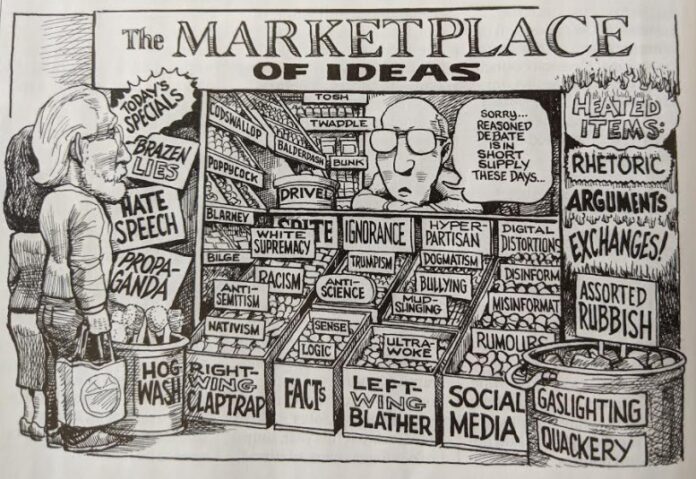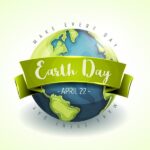The erosion of facts and truth has become endemic in the 21st century for much of the planet. Non-democratic governments are great spreaders of misinformation. And even in democracies, misinformed ideas are often being given equal weight to the truth. This has been particularly true with two major issues: the COVID-19 global pandemic, and anthropogenic climate change.
In the first week of U.S. President Donald Trump’s term in office, a spokesperson for him gave us a new term for lies which she called “alternate facts.” For the subsequent four years, we got our fill of alternate facts from inaugural crowd size, to climate change, to the environment, to COVID-19, the weather, election results, and the assault on the Capitol building in January of this year. I could name many more but would rather not.
Trump was disdainful of the truth, of logic, and of science. In a June 2020 headline from the New York Times entitled, “Trump Has Made Alternative Facts a Way of Life” we learned about just how many alternate facts were being spewed out daily. The average was 20.5 or more than 30,000 by the end of his term in office.
Trump’s assault on science was pernicious. He made the word protection in the Environmental Protection Agency (EPA) meaningless unless one was talking about protecting destructive activities by polluters. He called climate change a Chinese-fostered hoax. His EPA dismantled regulations to protect water, air, and land making the lives of Americans more precarious. How so?
In a 2018 article for Inside Climate News, Marianne Lavelle reported that a Harvard University study had calculated Trump’s impact on the EPA and the regulatory environment. It estimated 80,000 American lives over the average would be lost per decade from the rollbacks he instituted around clean air and water protections alone. The Harvard estimate was based on peer-reviewed science.
This was two years before COVID-19 which Trump referred to as the Chinese virus, and who treated it initially as something trivial, even suggesting at one point that people could drink bleach to kill the infection. This trivial virus, at the time of this posting, has now killed more than 3.3 million around the world including over 580,000 Americans.
Is Trump the first democratic leader to lie? Of course not. We know that Richard Nixon lied. Boris Johnson, the British Prime Minister concocted lies to win the Brexit vote. Many democratic leaders practice lies of omission, and certainly, government finance people lie with numbers all the time. Most of us expect that kind of lie, but not what Trump unleashed on America.
We don’t expect, in a democracy, the wholesale removal of scientific facts from websites such as occurred when all references to climate change were removed in 2017 from the EPA website. Trump officials when asked used euphemisms to describe the causes of increasing wildfires, prolonged droughts, record numbers of hurricanes, and other extreme weather events that the scientific community stated were evidence at hand of climate change. Trump even went as far as to blame California for poor forest management rather than the Southwest Megadrought that helped to induce the worst fire season in the state’s history. The irony was that the fires originated on federally-owned lands within the state.
In George Orwell’s novel, 1984, we are given lessons in political language where government truths are lies. Orwell creates for his imaginary polity slogans like “ignorance is strength” or “war is peace.” This is the language we associate with autocracies such as was practised in the late Soviet Union, the People’s Republic of China, and in many non-democratic countries around the world today. This is dangerous doublespeak designed to invert the meaning of words and confuse citizens. Fortunately, the free press, scientists, and knowledgeable citizenry can see through doublespeak.
This brings me to an even more disturbing realization, that is, how a culture of lying becomes endemic impacting all of society even those practising science. In a paper entitled “Scientific Deceit,” author Stephen John describes what he calls “wishful speaking,” that is, research results the scientists wanted getting published, rather than the results they got.
One way to determine the rate of lying in scientific research is to look at the number of scientific papers published, then later retracted. Data shows over the last few decades a tenfold increase in this phenomenon. In 2000, the number was 100. By 2019 the number was approaching 1,000. This increase reflects two things. First, one has to acknowledge the explosive growth in scientific papers with worldwide output rising on average 4% per year. That translates to output from 2008 to 2018, growing from 1.8 to 2.6 million published journal articles.
In 2020, when just looking at COVID-19 papers, 39 articles were retracted from pre-print servers and peer-reviewed journals. The Scientist lists some of the fraudulent research including one paper that posed data showing the virus had little effect on American deaths. Tell that to the plus 580,000 we know of so far (the number is considered lower than the actual total) who have succumbed to the virus.
For the public, when scientific papers are printing misinformation, what is the danger? Think about the current COVID-19 vaccine rollout and the confusion re the safety and efficacy of the various inoculation choices. In the hurry to rollout vaccines to combat the global pandemic, clinical research shortcuts have been taken. The results spread by the news media and online on social media sites have created confusion and concern in the general population. Part of the confusion lies with the general lack of public understanding of science and the scientific method. What do efficacy rates on vaccines mean? What is the significance of a clinical trial? How is the timeframe between the first and second dose determined?
The marketplace of ideas needs to be fact-based, whether these are ideas coming from the mouths of politicians or from the research being done in scientific laboratories. The public needs to become more educated to differentiate from this marketplace, the facts from the fiction. We don’t need QAnon conspirators, quackery, and other spreaders of nonsense dominating the conversation. The world today is in too precarious a state for us to afford to be led down the garden path by such as those who are willfully ignorant, ill-informed, or downright liars.









